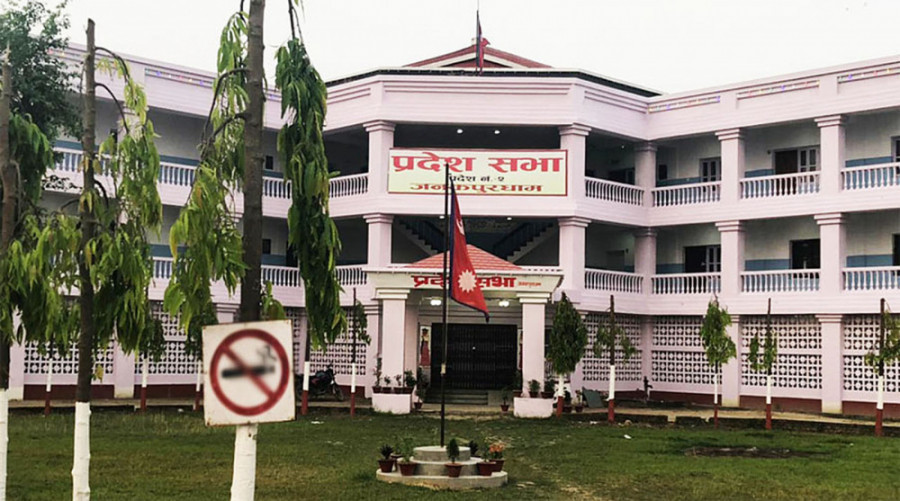Politics
A tug of war in Madhesh for chief minister’s chair
Observers say a power-sharing deal in the province looks trickier.
Nishan Khatiwada
It has been more than a week since the CPN-UML pulled out of the Madhesh provincial government. Three coalition partners—Nepali Congress, CPN (Unified Socialist) and Loktantrik Samajbadi Party—are yet to join the government led by Chief Minister Saroj Kumar Yadav of Janata Samajbadi Party that includes ministers from the CPN (Maoist Centre) and Janamat Party.
The exit of CPN-UML, the second-largest party in the federal parliament, and the right-wing Rastriya Prajatantra Party from the Maoist-led government at the end of February brought a new ruling alliance on the scene. The effects of the new power equation in Kathmandu, as usual, have trickled down to the provinces—some of them have gotten a new chief minister and in some, the Cabinet expansion process is underway.
In Madhesh Province, the Cabinet expansion seems to be knottier with many parties in the alliance eying the chief ministerial post. As per the earlier agreement, the Janata Samajbadi Party and the Janamat Party were to lead the Madhesh government, by turns.
“But as the UML is in the opposition now and a new power equation has emerged, the Janamat Party should get to lead the government in Madhesh,” said BP Shah, a Janamat leader.
Asked why the leadership of the provincial government should change when his party is a part of the ruling coalition, Shah said: “There is no certainty whether this coalition will sustain. The power equation can change at any time. We are a big power in Madhesh Province.”
Janamat Party quit the federal government on March 31 as it was miffed at having been denied the ministerial berth of its choice. The party’s minister Abdul Khan tendered his resignation after the Ministry of Industry that his party was eyeing was given to the Congress.
Party General Secretary Chandan Singh claimed that the Congress had already agreed to allocate the chief ministerial post to Janamat, by turn, even though the latter has been demanding it should lead the provincial government first. “The ruling coalition has betrayed us of late. We now lay our claim to lead the Madhesh government,” said Singh.
In the 107-strong Madhesh provincial assembly, the Nepali Congress has 22 seats, UML 23, Maoist Centre 8, Rastriya Prajatantra Party 1, Unified Socialist 7, Nagarik Unmukti Party 1, Janamat Party 13, Janata Samajbadi Party 16, and Loktantrik Samajbadi Party 9, Independent six, and Sanghiya Samajbadi Party one seat.
The Janata Samajbadi Party is now leading three ministries, the Janamat Party holds two, while the Maoist party leads one ministry in the province. Only four positions are vacant to appoint more ministers.
The Nepali Congress province chapter has also been claiming the chief ministerial position as the largest party in the coalition. Nitesh Gupta, publicity head of the party’s Madhesh chapter, said: “Odds are high that our party will lead the Madhesh government after the by-polls. But we will go by what is agreed upon at the centre,” said Gupta.
The Election Commission has scheduled by-elections in three federal constituencies for April 23. Ramchandra Paudel and Ramsahay Prasad Yadav—elected from Tanahun-1 and Bara-2 respectively—became the President and the Vice President. Rastriya Swatantra Party chair Rabi Lamichhane elected from Chitwan-2 had lost his parliamentary post after the Supreme Court invalidated the citizenship certificate he submitted during candidacy filing.
Though the outcomes of the elections won’t alter the situation in provinces, they will offer clues about the strengths of the emerging, regional and traditional forces. Since Singha Durbar politics is volatile, the presence of 10 parties in the central coalition makes it more fluid.
The Loktantrik Samajbadi Party has also been eying the position of chief minister in Madhesh as it believes that other coalition partners have got sufficient shares in the power deal.
“The Janamat Party should be toppled from the provincial government. Its claim has no meaning. We have staked a claim to lead the Madhesh provincial government. The Congress and the Maoist Centre are leading governments in other provinces,” said Keshav Jha, a Loktantrik Samajbadi leader. “Janata Samajbadi has been given the Vice President and the ruling coalition has backed Upendra Yadav’s candidacy in Bara-2.”
Upendra Yadav fights Janamat Party’s Shiv Chandra Kushwaha and UML’s Purushottam Paudel in Bara-2. The Rastriya Swatantra Party has fielded Ramesh Kharel, the former DIG of Nepal Police, in the constituency.
“As an ally in the new coalition, we must have a fair deal in power-sharing. As no single party has the numbers to form a government, we have our expectations in the coalition government. We got neither the President, the Vice President, the chief minister nor the Speaker. So we should get to lead the Madhesh provincial government in turns,” said Surendra Jha, another Loktantrik Samajbadi leader.
Janata Samajbadi spokesperson Manish Suman, however, said that only the claim of the Nepali Congress is valid as the largest force in the coalition. “And they can lead the government in Madhesh only after the Janata Samajbadi serves for the first half of the five-year term. As we have already got the vote of confidence, and we have not got the chance to work yet, we will serve during the first half. The Nepali Congress can lead the Madhesh government after two-and-a-half years,” said Suman.
Madhesh observers agree that a power-sharing deal in Madhesh looks trickier. They added that the parties have been focusing on making and breaking governments by completely ignoring the agendas, issues and development of the Madhesh province.
A Madhesh observer, Rajanikant Jha, said even though many governments have been changed, many ministers and chief ministers have come and gone, none focused on delivery, on solving local issues and problems, and on development.
“The provincial government has also been mired in corruption. Politicians have been focusing on recovering their election expenses. None of them has the vision to make Madhesh a model province,” said Jha.




 9.7°C Kathmandu
9.7°C Kathmandu














